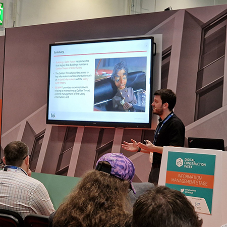Across the sector, there has been much research and reporting into skills shortages and how this impacts the construction industry. ‘There is no panacea’: says Beena Nana, Head of Skills at Trade Body FIS, but it is clear that if we are to solve this issue there needs to be a cultural change and we all need to step up and play our part.
The construction industry relies heavily on skilled workers to deliver projects on time, within budget, and to the required quality standards. However, when faced with a skills shortage, construction companies struggle to find and recruit workers with the necessary expertise, resulting in project delays, increased costs, and compromised project outcomes.
In the construction industry context, a skills shortage refers to a situation where there is a scarcity or insufficient supply of workers with specific skills or qualifications needed in various construction-related roles. It occurs when the demand for qualified workers with construction skills, surpasses the available pool of qualified individuals with those specialised skills.
It’s worth noting that a skills shortage is more than just a reference to the level of qualification a candidate requires. It also includes challenges in the UK labour market, such as:
• Difficulty in finding the right person for a job in the necessary location.
• Difficulty in hiring workers at the cost an employer can afford.
• Difficulty in finding workers that agree with the terms of employment.
What the data says
The Construction Skills Network (CSN) data from CITB acknowledges the substantial recruitment and training challenges facing industry and has predicted that 225,000 additional workers will be required to meet UK construction demand by 2027 (45,000 workers per year, down from last year's figure of 53,200).
Having interrogated this data, FIS estimated 266,000 people are employed in the construction occupations of our sector alone. To sustain this there’s an annual recruitment requirement of approximately 6,052 people per year to 2027. As there are approximately 10,000 organisations working in the sector that’s 1.65 people per organisation, or if every FIS member took on one new entrant per year that would meet one tenth of the estimated requirement.
What’s the answer?
I regret to say that there is no panacea. There has long been a culture of negativity when it comes to training across construction. I often hear ‘what is the point in training, when they just go to work for someone else’. This attitude must change if we are going to have any hope of meeting future skills needs.
It is certainly no longer feasible to think other bigger organisations with more resource will train enough people to go round. Addressing skills shortages requires a combination of policies, organisation adaptation, investment and a more targeted focus on education, training and upskilling by all. So, what can you do?
Cast your net
Reviewing recruitment strategies is a good starting point for organisations to attract workers into construction. In addition, attracting a more diverse workforce could have a transformative impact on the skills gaps.
FIS runs a number of programmes to help recruit and induct operatives into the finishes and interiors sector. We are currently working with DWP, Bounce Back, Women into Construction and Building Heroes, which all provide training for employment for individuals from diverse backgrounds.
Justin Devaney, Operations Director at FIS member Platt & Reilly, has been working with the Bounce Back charity which supports individuals in and leaving prison, for the last two years, said:“We are privileged to be in a position to assist Bounce Back by reintroducing people into society and it should be down to every company in the UK to voluntarily seek out ways to help less fortunate people.”
Catch them young
Construction has a poor image, so it is important that those working in the sector get the message out there to try to change perceptions. This can be achieved by engaging with local schools and colleges, where experienced workers can act as ambassadors to impart knowledge of the sector to make it more appealing and aspirational.
FIS is developing a robust STEM ambassador plan to support this. We are encouraging our members to sign up to become STAM ambassadors and developing tools to enable them to showcase the sector to younger people, demonstrating the career options available.
FIS Board member and MD of Nova Plasterboard Systems Jim Brennan has recently signed up as a STEM ambassador. Jim said: “The reason I signed up to become a STEM Ambassador was to have the ability to go into schools to tell them my story and get my message across to those attending that may be less academically minded than others.
“I also strongly believe that this could give those from poor backgrounds the opportunity to succeed. Hopefully, the programme will encourage those that only see a ‘dead end’ when they leave school to consider a career in construction. History influences everyone and a STEM Ambassador’s history path will influence those that feel there is no path.”
Grow your own
More organisations are beginning to understand the value apprenticeships can bring to both individuals and businesses, so are including this as part of their talent pipeline. Some have even taken things one step further and created their own training academies and are delivering training themselves to attract and retain the best people.
FIS member V&D Interiors set up its own academy in 2019, to provide trainees with the necessary training and assessments in-house to achieve recognised vocational qualifications in drylining and plastering. The initiative has been a great success, providing benefits both to the trainees and the company.
V&D Interiors Commercial Manager Calvin Challis said: “We know there is a serious shortage in skilled labour in the industry and wanted to do something about it. The academy allows us to tailor a specific training program to our organisations trade requirements, to produce a skilled workforce that is equipped, flexible and prepared for the challenges of today’s fit-out sector.”
Invest in your workforce
It should not be forgotten that whilst a new stream of workers is vital, those already in the industry should not be overlooked. Investing time and resources into current staff is a huge opportunity for construction companies to make the most of the workers they already have. Improving the training available to existing workers benefits the company and also opens up opportunities to workers previously hired at lower levels.
It is a huge selling point when appealing to potential employees as progression is essential to people when considering a career path. Seeing a clear way for progression and commitment from organisations to the advancement of staff can be a great incentive to join the sector.
The future
Everyone knows investing in training can bring competitive advantages, helping businesses to retain and attract more workers and to ensure they have an upskilled workforce to win new work is a focus for FIS. However, the current business environment is making it more challenging to invest in the training and qualifications needed to ensure a future workforce for the sector, but if organisations don’t step up now, think what it is going to be like in the years ahead.
FIS continues to work with its members and the wider community to respond to these challenges. Using lessons learnt from previous projects has enabled us to be flexible to meet industry needs, or at least work towards reducing the impact the skills shortage is having. You can contact the skills team on 0121 707 0077 or visit the skills hub at www.thefis.org/skills-hub















